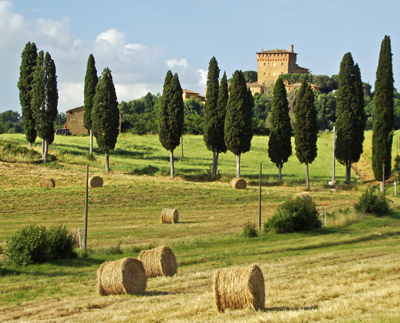
Yes, the financial world is still wobbly, but maybe now is not such a silly time to be thinking about buying property in Italy, precisely in Lucca aerea (Tuscany). We spoke to estate agent Roy Santi, who for over a decade has been selling property throughout the area.
So, is this a good time to buy?
Obviously a lot depends on where you have access to money and of course exchange rates. But yes, there are definitely bargains to be found. For example, from sellers who bought several years ago and are now moving on. There will always be people who need to sell and there are always people who have the money to take advantage.
So what should I be asking myself?
In that sense, it’s no different from buying a house anywhere else. Town, country, seaside, rural seclusion or would you like to be less dependent on a car? What about access to airports, train stations and motorways? Olive grove or terrace? Are you up for a restoration, or perhaps something already restored is more your style? You should have a clear idea as to your brief but also be prepared to compromise. Once you are clear about you wants and dislikes anly then can an agent help realise your abjectives and guide you through a sea of bureaucracy, It maust be said that people instinctively know when a property is right for them.
But an agent will be acting for the seller?
No, in Italy the agent is essentially a broker tasked with bringing the buyer and seller together in a mutually satisfactory deal and their fee is shared between the parties. The only time an agent can be biased is when a buyer invites him to act on his or her behalf in approaching a second agent.
So how do I find a good agent?
Agents must be registred on the professional register held at the local Chamber of Commerce so check there. Do they have an office? While obviously a lot can now be done by internet, a physical base suggests they are not a “fly by night” business and have a local reputation to protect. Ask around, a recommendation is often positive. It helps to have an agent who speaks English, as with many foreign buyers and sellers in Tuscany, English is now often the lingua franca in transactions. But remember if a person does not understand Italian, the deeds can be written in a two language format, failing which a special power of attorney can be given to a bilingual person.
So what does an agent do?
The agent’s role is primarily to understand the needs of a client and assist them in realising their objectives. Once we have found the right property it’s my job to get both the buyer and vendor to the altar! The initial contract between the buyer and the vendor, the “compromesso”, is like an engagement, it outlines the deal. And both parties have to be aware of the financial penalties for pulling out later. Then obviously a time frame is agreed to, by which time the deal must be completed. The seller is obliged to produce evidence of sound title, e.g. deeds, building permits, and the buyer may have to arrange financing and perhaps have a geometra or engineer inspect to property, particulary if it is an older house. When it comes to the “rogito” or final contract, this is where the deal is formally completed, in front of a “notaio” who although paid for by the buyer. is really like the parish priest officiating at the ceremony, making sure everything complies with the rules, collecting the taxes for the State, and then registering the transfer of ownership.
And how much does an agent cost?
A commission of 3% of the selling price is normal, although negotiable on high value properties. The agents are paid at the “compromesso” stage but tend to be present until the final signing and sometimes beyond. Of course it’s not unheard of for people to find their own property to buy, but in these cases I would strongly suggest that they find an agent to step in as their technicial assistant.
So just what should I be budgeting for?
Your agent should be able to advise, but essentially as a buyer you should allow for:
1) the price
2) tax which isa a one off payment, and varies from case to case. It is a percentage of the “valore catastale” and depends on whether it is a primary residence or second home
3) the “notaio’s” fees for countersigning the deal
4) “bolli” one off stamp duty
5) techinical reports from a “geometra” or engineer
6) your share of the agent’s commission.
Find Roy Santi at www.housesintuscany.com
Via Marconi, Barga – Lucca – Tel +39 348 8607786




